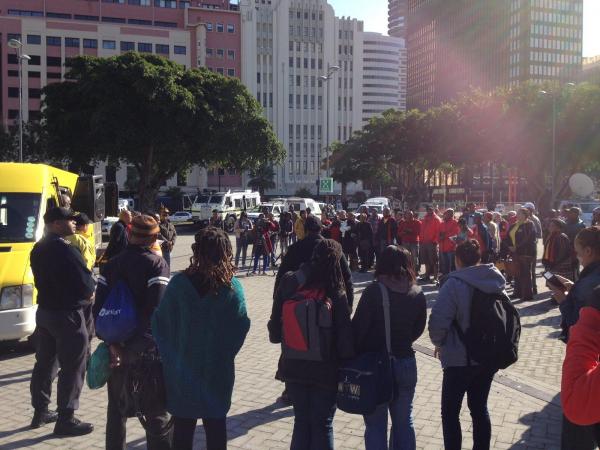COSATU says Metrorail blocked their members from travelling to protest

On Saturday, 12 July, COSATU held a demonstration at Cape Town Station to demand improved train service and that Metrorail lower fares to the same as before the recent ticket price increase.
A few dozen people participated, a lower turnout than was expected. Demonstration leaders said that workers who headed to the city centre from certain stations were prevented by Metrorail employees from boarding the trains.
The demonstration was scheduled to begin between 10 and 11am, but by 11:30am, as music pumped through the plaza and police officers stood by, leaders were still waiting for a critical mass of workers to arrive. According to COSATU officer Mike Louw, union members were supposed to have been on the trains at 9 am. But at around 10 am, the COSATU leaders, who were already at the Cape Town station, found out from union members in Khayelitsha that “Metrorail workers weren’t letting people get on the trains,” says Louw.
Louw says that, a week earlier, COSATU officials had alerted Metrorail officials to the demonstration so that Metrorail would inform employees at all stations. COSATU had paid for the workers’ train tickets, and the workers, identifiable by their union pamphlets or T-shirts, would tell the ticket sellers that they were heading to the demonstration. When he found out that workers weren’t allowed to board the carriages, “We told [Metrorail] that it would seem as if they’re sabotaging us,” says Louw.
Members of the non-profit organisation Sobahlangula had also planned to demonstrate in solidarity with COSATU. COSATU’s pre-arrangement with Metrorail was also supposed to accommodate Sobahlangula demonstrators, says chairperson Lotta Mayana. But on Saturday, Mayana says, Metrorail employees at Khayelitsha, Malmesbury and Philippi stations did not allow Sobahlangula members without tickets to board the train. “The Metrorail people told [the demonstrators] that they would disrupt business in town,” says Mayana.
When asked whether COSATU workers and demonstrators were denied access to the trains on Saturday, Metrorail spokesperson Riana Scott replied via email that the allegations were “devoid of truth.”
Zoghra Jaftha, a member of the Southern African Clothing & Textile Workers’ Union (SACTWU) who had come to the demonstration by taxi, said, “I was hoping we were going to get somewhere with a peace march.” But, around 11:30, she acknowledged, “There’s not a lot of people here.” Workers want improved services but “don’t want to do anything about it,” she says.
At around 11:40 am, the union members who stood on the plaza—most of whom had arrived by car or taxi—gathered in a semicircle to witness COSATU leaders Louw and Tony Ehrenreich hand the memorandum to Metrorail manager Richard Walker. Before signing the memo on behalf of Metrorail, Walker, who took up his position three weeks ago, responded. “We don’t want to make excuses,” he said, but, in order for long-term improvements to take place, “certain lines will be affected” in the short-term. He promised that Metrorail would give an official response by COSATU’s 48-hour deadline.
By noon, the demonstration had ended and the small crowd dispersed. SACTWU regional organiser Sheila van Rensburg said she was surprised by the low turnout, but, “a lot of people are waiting for the actual day to strike.” She says she is confident that, when the day comes, “the support will be overwhelming.”
Next: UCT students demonstrate in solidarity with the people of Gaza
Previous: Over-population is not the problem

This article is licensed under a Creative Commons Attribution-NoDerivatives 4.0 International License.


